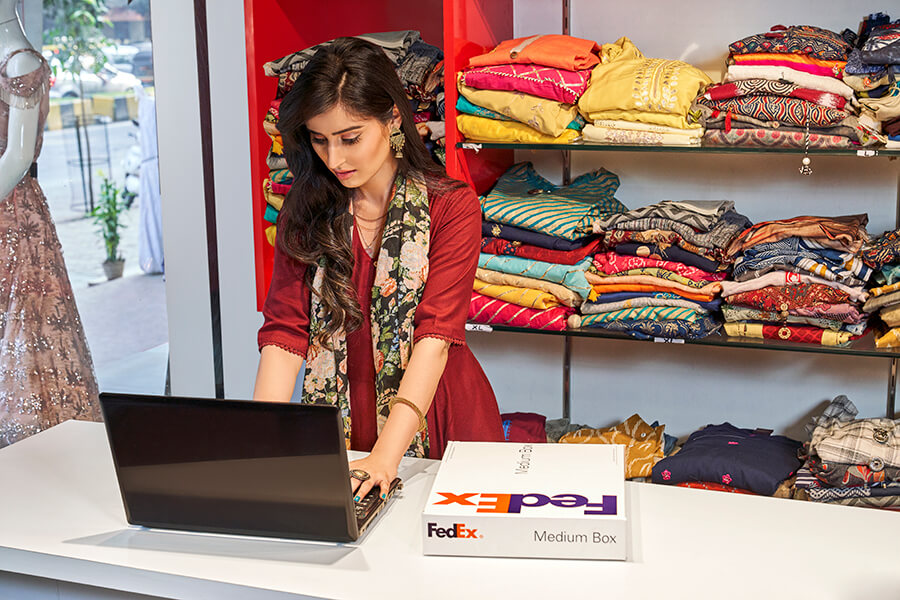How To Build Equity For Female-Owned Businesses
Female-owned and led businesses are helping to build greater gender equity and create inclusive workplaces where women can thrive. Entrepreneur Rhea Singhal shares tips on bridging the gender gap.
I’m the founder of one of India’s largest sustainable packaging companies, Ecoware. When I walk the factory floor, I’m proud to see so many women operating our machinery - but it wasn’t always this way.
As an entrepreneur and employer, I’ve learned that there are specific ways we can support women to progress in their careers, upskill, and access greater opportunities. The more we invest in making the workplace an inclusive, empowering environment for all genders, the better.
On the SME front, we saw many women-led enterprises dissolve or suffer setbacks due to lack of funding in the wake of COVID-19. There’s an urgent need to rebalance the system.
As an entrepreneur and employer, I’ve learned that there are specific ways we can support women to progress in their careers, upskill, and access greater opportunities. The more we invest in making the workplace an inclusive, empowering environment for all genders, the better.
On the SME front, we saw many women-led enterprises dissolve or suffer setbacks due to lack of funding in the wake of COVID-19. There’s an urgent need to rebalance the system.

Working to close the gender gap and build greater equity for women in all walks of life is a universal challenge. And starting a business in India has given me first-hand experience of how to be flexible in a country with so many different cultures, languages, religions and socio-economic backgrounds.
Attitudes and ways of working change from North to South and rural communities are different from cities. Overall, we want to create a fair and inclusive environment that offers the same growth platform for all women, no matter where they come from.
Here are my tips for SMEs looking to cultivate diverse, gender-supportive workplaces with an inclusive company culture:
Attitudes and ways of working change from North to South and rural communities are different from cities. Overall, we want to create a fair and inclusive environment that offers the same growth platform for all women, no matter where they come from.
Here are my tips for SMEs looking to cultivate diverse, gender-supportive workplaces with an inclusive company culture:

1. Avoid a one-size-fits-all approach - it can lead to exclusion
All genders, especially women, need to be offered flexible hours and remote working opportunities if the job allows. Every woman’s circumstances are different. Many are juggling multiple roles, including caregiving or childcare. Our youngest employees are just starting out in the workplace, whilst some are returning after having a family.
At Ecoware, our factory operates both day and night shifts. Typically, it’s more difficult for women, with families and households to take care of, to work nights. We make sure their work schedule provides the right work-life balance. It’s all about creating tailored, flexible solutions that empower women to achieve.
2. Upskilling is your responsibility – and will help you become more diverse
All genders, especially women, need to be offered flexible hours and remote working opportunities if the job allows. Every woman’s circumstances are different. Many are juggling multiple roles, including caregiving or childcare. Our youngest employees are just starting out in the workplace, whilst some are returning after having a family.
At Ecoware, our factory operates both day and night shifts. Typically, it’s more difficult for women, with families and households to take care of, to work nights. We make sure their work schedule provides the right work-life balance. It’s all about creating tailored, flexible solutions that empower women to achieve.
2. Upskilling is your responsibility – and will help you become more diverse
Typically, our female employees aren’t coming in the door and walking into machine operator roles. A lot of women start off in the packaging department, because it's an easier place to start.
With our support, operating machinery is something they work up to. It’s now a real point of pride for us that we’re closing the gender gap and seeing more women working in manufacturing . A huge part of this is upskilling: investing in the time and training to enable women to learn on the job.
With our support, operating machinery is something they work up to. It’s now a real point of pride for us that we’re closing the gender gap and seeing more women working in manufacturing . A huge part of this is upskilling: investing in the time and training to enable women to learn on the job.

During COVID, we saw a lot of women with brick-and-mortar businesses have to pivot and start selling on e-commerce platforms. Right away, they accelerated their reach. Revenues went up. But support is needed around digitalization. Some of the women’s forums I’m involved with ran workshops around how to improve e-commerce operations skills, manage different payment gateways, or use social media ads to grow customers.
3. Invest in employee wellbeing
SMEs must invest in robust workplace wellness initiatives, from mental health support to community events and DEI education.
To help drive change from within, we run quarterly workshops on everything from health and safety to mental wellbeing and how to report inappropriate behavior. One useful tip for SMEs: if you lack the bandwidth or internal expertise to run workshops in-house, reach out to local NGOs. They’re highly credible, and can step in as educators if your resources are stretched.
4. Be proactive in recruitment – you won’t achieve a diverse workforce unless you push for it
Our target is to make sure that we have a diverse workforce, not only in the factory but in our operations, front office, marketing and design teams. Hiring people of all genders remains a priority, especially as the impact of COVID wasn’t gender-neutral and hit women harder across the globe.
Given the nature of our business as a manufacturer, it’s no surprise that we started out with a male-dominated workforce. I’m proud to say that 30% of our team is now female. My husband and I founded this business, and from the beginning we wanted women to be a core part of our team.
It’s important to be proactive; we even asked male employees to recommend female candidates - women in their communities looking for a job - to help us redress the gender imbalance.
3. Invest in employee wellbeing
SMEs must invest in robust workplace wellness initiatives, from mental health support to community events and DEI education.
To help drive change from within, we run quarterly workshops on everything from health and safety to mental wellbeing and how to report inappropriate behavior. One useful tip for SMEs: if you lack the bandwidth or internal expertise to run workshops in-house, reach out to local NGOs. They’re highly credible, and can step in as educators if your resources are stretched.
4. Be proactive in recruitment – you won’t achieve a diverse workforce unless you push for it
Our target is to make sure that we have a diverse workforce, not only in the factory but in our operations, front office, marketing and design teams. Hiring people of all genders remains a priority, especially as the impact of COVID wasn’t gender-neutral and hit women harder across the globe.
Given the nature of our business as a manufacturer, it’s no surprise that we started out with a male-dominated workforce. I’m proud to say that 30% of our team is now female. My husband and I founded this business, and from the beginning we wanted women to be a core part of our team.
It’s important to be proactive; we even asked male employees to recommend female candidates - women in their communities looking for a job - to help us redress the gender imbalance.

5. Make sure you communicate properly – it should be a two-way street
I believe the biggest thing that's helped me build trust with my team is our open-door policy. We’ve been able to build better communication, quicker solutions, stronger relationships and facilitate open conversations.
Many changes that organizations need to implement to improve gender equity and working conditions for women wouldn’t be possible without honest feedback. It’s important to establish an open forum for two-way communication with your teams and co-workers.
At Ecoware, we value visible leadership and direct communication. I sit in on as many meetings as possible at all levels and areas of the business so I can hear from everyone and empower the required action. We also established a female committee in our factory to offer support on women’s issues.
6. Be ready to offer outside-the-box solutions if they can provide real benefit
Taking responsibility for your workforce means pushing for changes that benefit them. It may sound simple, but one of the key things we did at Ecoware was to set up bank accounts for all our female employees.
In India, this empowered our female employees immensely, handing them financial independence overnight. Depending on where you’re operating your business, cultural nuances and local context may offer an opportunity for you to jump in and make a difference.
7. Increase your visibility to help drive change for women everywhere
Becoming a female entrepreneur can give you a platform to use your voice to champion and empower other women, or mentor younger, first-time female SMEs. It’s easy to pour all of your energy into running your business, but I’d encourage women to contribute as much as they can to forums and speaking panels. Lend your expertise to non-profits and organizations that support women.
I believe the biggest thing that's helped me build trust with my team is our open-door policy. We’ve been able to build better communication, quicker solutions, stronger relationships and facilitate open conversations.
Many changes that organizations need to implement to improve gender equity and working conditions for women wouldn’t be possible without honest feedback. It’s important to establish an open forum for two-way communication with your teams and co-workers.
At Ecoware, we value visible leadership and direct communication. I sit in on as many meetings as possible at all levels and areas of the business so I can hear from everyone and empower the required action. We also established a female committee in our factory to offer support on women’s issues.
6. Be ready to offer outside-the-box solutions if they can provide real benefit
Taking responsibility for your workforce means pushing for changes that benefit them. It may sound simple, but one of the key things we did at Ecoware was to set up bank accounts for all our female employees.
In India, this empowered our female employees immensely, handing them financial independence overnight. Depending on where you’re operating your business, cultural nuances and local context may offer an opportunity for you to jump in and make a difference.
7. Increase your visibility to help drive change for women everywhere
Becoming a female entrepreneur can give you a platform to use your voice to champion and empower other women, or mentor younger, first-time female SMEs. It’s easy to pour all of your energy into running your business, but I’d encourage women to contribute as much as they can to forums and speaking panels. Lend your expertise to non-profits and organizations that support women.

But in your own business, too, it’s important to be vocal, to champion change and have your team members see you doing so. It’s hugely important to create a strong leadership culture, establish core values and an inclusive workplace community. That includes safe spaces for women at all levels.
If you’re a founder or manager, make it a priority to be visible and accessible. My team members see me on the factory floor, in the office and out in the sales field.
8. Be an active mentor to help women navigate what’s next
Melinda Gates once said ‘a woman with a voice is by definition a strong woman. But the search to find that voice can be remarkably difficult.’
If you’re a founder or manager, make it a priority to be visible and accessible. My team members see me on the factory floor, in the office and out in the sales field.
8. Be an active mentor to help women navigate what’s next
Melinda Gates once said ‘a woman with a voice is by definition a strong woman. But the search to find that voice can be remarkably difficult.’
As an employer or manager, encouraging women to move outside of their comfort zone is important. I’m aware that for many of my female employees this might be their first job. Create possibilities for them. Encourage ambition. Actively check in with your teams to find out what excites them and what they want to try next.
As a female business owner, you directly impact the way other women work and grow . Exhibiting strong values and being more inclusive will lead to greater success for girls and women everywhere. We need women to be strong allies to each other.
9. Think about ways your company can bridge the digital gap – particularly in STEM
We need to encourage far greater female participation in STEM (science, technology, engineering and maths). There are certain sectors women are drawn to because they feel more comfortable in them.
We need to build awareness of opportunities in other sectors and create a platform of equity, whether it's admission ratios or targets for fair representation across all industries, from aviation to architecture. STEM integration and fostering a digital mindset needs to start young.
I’m a member of the Confederation of Indian Industry (CII) and we focus on getting more female representation in STEM, improving the roles of women in manufacturing, and helping women to use their skills to drive the national economy. I also work with the National Commission of Women, and various schools and colleges, where we aim to cultivate female entrepreneurship and encourage female founders.
10. Address gender equity right across the board
One more thing. To be a gender-responsive and inclusive business, prepare yourselves for conversations and scenarios that go beyond just male and female. It’s important to provide a safe and supportive environment for all genders, include those who identify as non-gender or non-binary. This is especially important for younger generations who expect to be treated with respect and inclusion.
As a female business owner, you directly impact the way other women work and grow . Exhibiting strong values and being more inclusive will lead to greater success for girls and women everywhere. We need women to be strong allies to each other.
9. Think about ways your company can bridge the digital gap – particularly in STEM
We need to encourage far greater female participation in STEM (science, technology, engineering and maths). There are certain sectors women are drawn to because they feel more comfortable in them.
We need to build awareness of opportunities in other sectors and create a platform of equity, whether it's admission ratios or targets for fair representation across all industries, from aviation to architecture. STEM integration and fostering a digital mindset needs to start young.
I’m a member of the Confederation of Indian Industry (CII) and we focus on getting more female representation in STEM, improving the roles of women in manufacturing, and helping women to use their skills to drive the national economy. I also work with the National Commission of Women, and various schools and colleges, where we aim to cultivate female entrepreneurship and encourage female founders.
10. Address gender equity right across the board
One more thing. To be a gender-responsive and inclusive business, prepare yourselves for conversations and scenarios that go beyond just male and female. It’s important to provide a safe and supportive environment for all genders, include those who identify as non-gender or non-binary. This is especially important for younger generations who expect to be treated with respect and inclusion.
***
Globally and locally, economies can only be a success if women are contributing just as much as men towards GDP. All stakeholders including governments and schools need to work together to bring women to the forefront of economic activity and entrepreneurship. SMEs are the backbone of the economy, and we need to keep it that way.
My advice for female entrepreneurs? Empower other women with your learnings and experience. That way, we can all grow together. When women stand by each other, we create opportunities for one another. When we're all empowered, everyone wins.
My advice for female entrepreneurs? Empower other women with your learnings and experience. That way, we can all grow together. When women stand by each other, we create opportunities for one another. When we're all empowered, everyone wins.




















 The Latest
The Latest